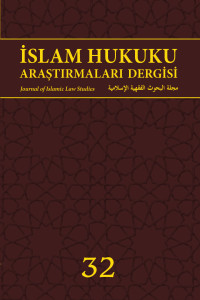Abstract
Zaman ve mekanlar üstü Kur’ân’ın kıyamete kadar bâkî son ilahî kitap olduğundan, onun her ayetinin her zaman ve zemine hitap eden mesajları ve hükümlerinin olacağı açıktır. O itibarla Kur’ân’ın hukuka ilişkin çok sarih ve kat’î nasları yanında, erbâbına kendisini açarak bir çok hukukî mesele için temel teşkil edecek nice ayetleri bulunmaktadır. Peygamber kıssalarını veya geçmiş ümmetlerin şeriatlerini konu alan ayet/hadisleri de bu bağlamda düşünmek gerekir. Hz. Eyyûb kıssasının fıkhî/hukukî açıdan incelmeye tâbi tutulacağı bu çalışmayla Kur’ân’ın nasıl bitmez tükenmez bir hazine olduğu, salt tarihi olay algılanabilen ve ibret yönü öne çıkarılan bu kıssaların birçok fıkhî hükme nasıl kaynaklık yaptığı ve daha nice fıkhî hükme kaynaklık yapabileceğini göstermek amaçlanmıştır. Makalede Kur’an kıssaları ve şer’u men kablenâ’nın kaynak değeri konusuna özetle değinilecek, kısaca Hz. Eyyûb’un hayatına yer verilecek, daha sonra Hz. Eyyûb’un konu edildiği ayet ve hadislerden çıkarılan fıkhî hükümler arz edilmeye çalışılacaktır. Bahse konu hükümler etrafında fakihlerin farklı yaklaşımları ortaya konmaya çalışılacaktır.
Abstract
It is evident that since the Qur’an is the last divine book which transcendents the time and space until the end of the world, every verse of it will always have messages and judgments for all times and spaces. For this reason, besides the very clear and solid verses of the Qur’an, there are many verses that when an expert saw them they became a basis for many legal issues like a buds which can be a rose in the hand of experts. It is necessary to consider the verses and hadiths related with the narratives of Prophets or the Sharia of the past ummah in this context. In this study which will be subject to the review Prophet Ayyub’s narrative’s juridical / legal aspects, it is aimed to show that how the Qur’an is an inexhaustible treasure, and how events which can be perceived as just historical cases can be the source of many jurisdictions. In this article, it will be mentioned to the Qur’anic narratives and Sharia of the past ummah briefly, and to Ayyub’s life, then judgements which were extracted from the Qur’anic verses and hadiths related with Prophet Ayyub’s life will be presented. It will be tried to reveal the different approaches of the Islamic jurists about these judgements.
Details
| Primary Language | Turkish |
|---|---|
| Subjects | Religion, Society and Culture Studies |
| Journal Section | Research Articles |
| Authors | |
| Publication Date | October 30, 2018 |
| Submission Date | May 1, 2018 |
| Published in Issue | Year 2018 Issue: 32 |


